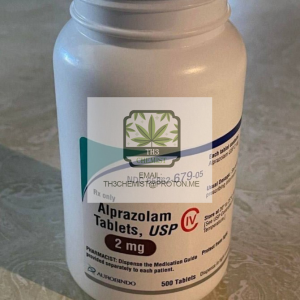Buy Xanax Online
-

Xanax B707 Blue
$210.00 – $500.00 Select options This product has multiple variants. The options may be chosen on the product page -

Xanax R039 Yellow Bus 2mg
$210.00 – $500.00 Select options This product has multiple variants. The options may be chosen on the product page -

Xanax S903 Green Hulk
$210.00 – $500.00 Select options This product has multiple variants. The options may be chosen on the product page -

Xanax Y21 White UK
$210.00 – $500.00 Select options This product has multiple variants. The options may be chosen on the product page
Xanax, also known by its generic name alprazolam, is a medication that belongs to the benzodiazepine class. It is primarily prescribed to treat anxiety disorders and panic attacks. Xanax is a popular and widely used drug due to its ability to provide rapid relief from symptoms of anxiety. However, it is important to use Xanax cautiously and as directed by a healthcare professional due to its potential for misuse and addiction.
What is Xanax Used for?
Xanax is primarily prescribed for the management of anxiety disorders, including generalized anxiety disorder (GAD), panic disorder, and social anxiety disorder. It is also used in certain cases to alleviate the symptoms of anxiety associated with depression. Xanax is classified as a short-acting benzodiazepine, which means it takes effect quickly and has a relatively short duration of action.
How Does Xanax Work?
Xanax acts on the central nervous system by enhancing the effects of a neurotransmitter called gamma-aminobutyric acid (GABA). GABA is responsible for inhibiting excessive brain activity and promoting a calming effect. By increasing the activity of GABA, Xanax helps to reduce anxiety, relax muscles, and induce sleep.
Understanding the Effects of Xanax
Immediate Effects
When taken as prescribed, Xanax can provide rapid relief from symptoms of anxiety and panic attacks. It promotes a sense of relaxation and calmness, which can help individuals cope with their anxiety-related symptoms. Xanax can also induce drowsiness and sedation, which is beneficial for those experiencing insomnia or sleep disturbances due to anxiety.
Potential Side Effects
Like any medication, Xanax may cause side effects in some individuals. Common side effects of Xanax include drowsiness, dizziness, blurred vision, headache, and difficulty concentrating. It can also lead to confusion, memory problems, and impaired coordination. Some individuals may experience gastrointestinal issues such as nausea or constipation.
Risks and Precautions
While Xanax can be an effective treatment for anxiety, it is important to be aware of the potential risks and precautions associated with its use. Xanax has a high potential for misuse, dependence, and addiction, especially when used for extended periods or in higher doses than prescribed. Abruptly stopping Xanax can result in withdrawal symptoms such as rebound anxiety, insomnia, irritability, and seizures in severe cases.
Xanax should not be combined with alcohol or other substances that depress the central nervous system, as this can increase the sedative effects and potentially lead to respiratory depression or overdose. It is important to disclose all medications, supplements, and substances you are taking to your healthcare provider to avoid any potential interactions.
Potential for Dependency and Addiction
Due to its calming effects and potential for euphoria, Xanax can be habit-forming and lead to psychological and physical dependence. It is crucial to take Xanax exactly as prescribed and under the supervision of a healthcare professional. Misuse or prolonged use of Xanax can result in tolerance, meaning higher doses are needed to achieve the same effects. This can increase the risk of overdose and other serious complications.
Seeking Medical Advice and Proper Usage
If you believe that you could benefit from Xanax or are experiencing symptoms of anxiety, it is important to consult a healthcare professional. They will assess your condition, take into account your medical history, and provide guidance on whether Xanax is an appropriate treatment option for you.
Starting Xanax Treatment
When starting Xanax, it is crucial to follow the prescribed dosage and administration instructions carefully. Xanax is typically initiated at a low dose and gradually increased as necessary. Your healthcare provider will monitor your response to the medication and make any necessary adjustmentsto ensure optimal effectiveness and minimize the risk of adverse effects.
Regular Monitoring and Evaluation
During your Xanax treatment, regular monitoring and evaluation are essential. Your healthcare provider will schedule follow-up appointments to assess your progress, adjust the dosage if needed, and evaluate any side effects or concerns. It is crucial to communicate openly with your healthcare provider and report any changes or difficulties you may experience during the course of treatment.
Important Precautions
When taking Xanax, it is important to adhere to certain precautions to ensure your safety and well-being. Here are some important guidelines to keep in mind:
- Avoid Alcohol: Alcohol should be avoided while taking Xanax, as it can enhance the sedative effects and increase the risk of respiratory depression and other complications.
- Follow the Prescribed Dosage: Take Xanax exactly as prescribed by your healthcare provider. Do not increase or decrease the dosage without consulting them first.
- Inform Your Healthcare Provider: Make sure to inform your healthcare provider about any other medications, supplements, or substances you are taking. Some medications and substances may interact with Xanax and affect its effectiveness or increase the risk of side effects.
- Be Aware of Potential Interactions: Xanax can interact with certain medications, such as antidepressants, anticonvulsants, and opioids. Inform your healthcare provider about all the medications you are taking to avoid any potential interactions.
- Avoid Driving or Operating Machinery: Xanax can cause drowsiness and impair coordination, making activities such as driving or operating machinery unsafe. It is advisable to avoid such activities until you are aware of how Xanax affects you.
- Do Not Stop Abruptly: If you have been taking Xanax for an extended period, do not stop taking it abruptly. Abrupt discontinuation can lead to withdrawal symptoms. Consult your healthcare provider for guidance on tapering off the medication if necessary.
Conclusion
Xanax, or alprazolam, is a medication commonly prescribed for anxiety disorders and panic attacks. It works by enhancing the effects of GABA, a neurotransmitter that promotes relaxation and reduces anxiety. While Xanax can provide effective relief, it is essential to use it cautiously and as directed due to the potential for misuse, dependency, and addiction.
If you believe that Xanax may be beneficial for your anxiety symptoms, consult a healthcare professional who can assess your condition and provide appropriate guidance. Remember to follow the prescribed dosage, be aware of potential side effects and interactions, and communicate openly with your healthcare provider throughout your treatment.
By using Xanax responsibly and under medical supervision, you can maximize its benefits while minimizing the risks associated with its use.
Touch Downs & Deliveries


















